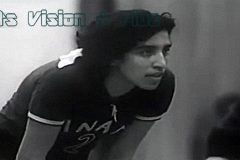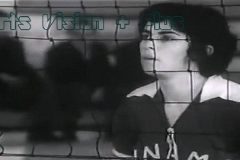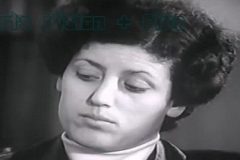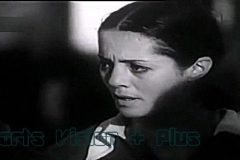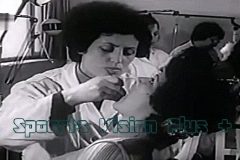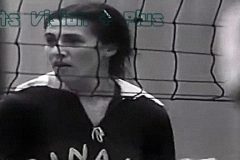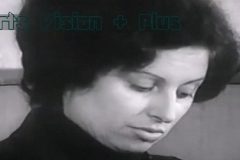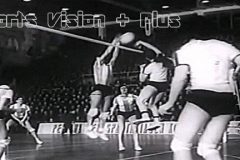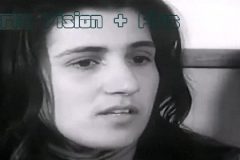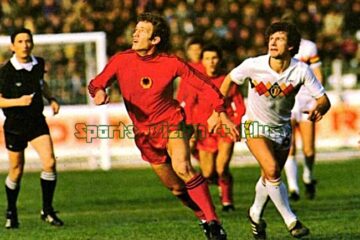“Spiking Their Way to Glory: The Unforgettable Dinamo Women’s Volleyball Champions”!
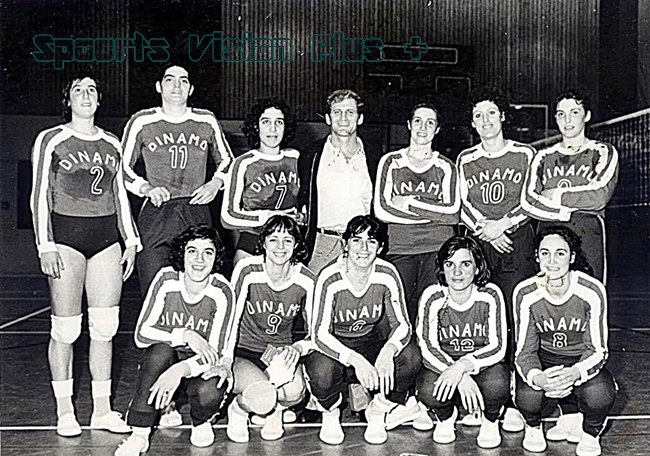
“Block, Set, Victory: The Legendary Dinamo Volleyball Team
That Ruled the 80s”!
Intro
Tirana, Albania, 1980s. The city pulsed with energy, and its sports scene was no exception. Amidst this vibrant backdrop, Dinamo’s women volleyball team emerged as a force to be reckoned with, captivating fans and inspiring a nation.
The 1980s were a transformative time for Albanian sports, and Dinamo volleyball team was at the forefront of this revolution. With their impressive skills, unwavering teamwork, and unrelenting passion, they left an indelible mark on the Albanian of volleyball.
In the annals of Albanian sports history, few teams have shone as brightly as Dinamo volleyball squad. With a legacy forged in the heat of competition, this team’s story is one of triumph, perseverance, and dedication.
Dinamo was a prominent volleyball women team in Albania. Dinamo Sports Club was affiliated with the Albanian Ministry of Internal Affairs. The team competed in the Albanian Volleyball League and the European Champions Cup (now known as the CEV Champions League).
During the 1980s, Dinamo experienced significant success, winning multiple Albanian championships and participating in European competitions.
1.
Dinamo made a revolution in miniature, both in the field of women’s emancipation and in opening a new spirit in sports.
In sports, over the years, great names of athletes, or even successful teams have been born that have made eras in different periods, even making history in world sports.
Champions have left their mark and created models, successful examples to the point of becoming incomparable. Over the years, their evolution has made things move towards the best and perfection, improving every record and every model. Athletes and teams take each other’s place, with the old being replaced by new models and examples, however, this has not happened in Albania.
The examples of an athlete, a club, or a former team, it seems that time has stopped right there, they have been archived and now belong to history, but the experience and sports history have not been inherited.
For them and for that time, people talk about it with nostalgia, as if those teams or athletes lived centuries and centuries away.
Society and the generation before the 90s live with nostalgia for the past. Today’s younger generations are surprised when you tell them that once upon a time in Albania there were sports and athletes even more successful than today and just as popular sports to follow as football.
Some blame the current system Albania is going through and others give credit to the old system, and this is another story that we do not intend to address in this article.
Albania, being part of the Eastern bloc, followed in most cases the Eastern models and with two teams representing the institutions of the state of the time, such as Partizani, the team of the Ministry of Defense, and Dinamo, of the Ministry of Interior, and thus being an international rule where all the institutions of a state were located in the capital, it was “common sense” for these two teams to be named (erroneously) as the teams of Tirana!
What if the capital was Skrapar?
However, it was these two clubs that made the history of Albanian sports, dominating the scene and winning countless trophies and successes, producing generations of athletes and champions of Albania from their ranks.
In the late 70s and early 80s, a truly world-class team was emerging in Albania, without exaggeration, ranked among the best clubs in Europe, such as the women’s volleyball team Dinamo, which was led by coach Kreshnik Tartari.

2.
Kreshnik Tartari is one of the most prominent figures in volleyball in Albania, both as a player and as a coach. In the 1971-1972 season, in the Men’s Champions Cup, he would rank fourth as a player for Dinamo, while in the 1989-1990 season he would rank third in Europe as the coach of the women’s team of the same team.
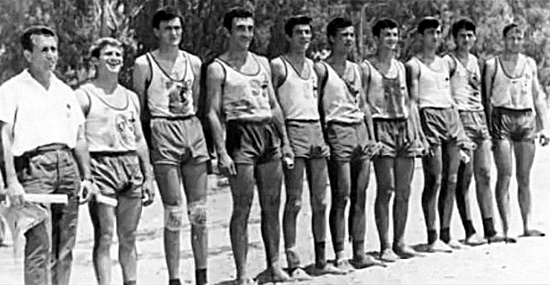
Dinamo Men Team of the `70ties
His career is enriched with achievements and successes, cups, trophies, titles both domestically and abroad, in the international arena.
At the Mediterranean Games “Latakia 1987” he won the “Gold Medal” with the women’s national team. The “Merited Master of Sports”, the man of over 400 international matches and over 2000 official matches, has won everything in his career as a sportsman and coach: 26 times national champion as a volleyball player and coach; 18 times winner of the Republic Cup, as a player and coach,
17 times participant in the European Cup editions, as a player and coach.
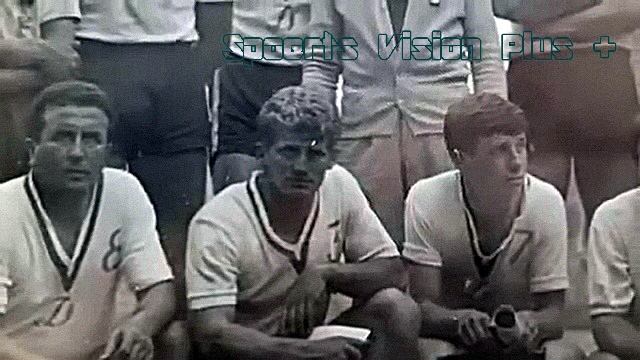
In center is K. Tartari as player alongside with Dinamo team
Honored by the “Telesport” television and the “Sport Plus” newspaper with the prestigious award “Medal of Merit, for excellent results in sports” during the “Gala” ceremony held on December 15, 2014 at the “Tirana International” Hotel. But, the “Great Master of Labor”, could not take the award all for himself, but he shared it with the volleyball players of the mythical team that he created in the years 1975-1990.
Tartari has been decorated with the titles of “Honor of the Nation”, “Honor of Albanian Sport”, “Olympic Order”, among others. He is the architect of Dinamo, one of the monuments of Albanian sport, especially in the international arena. Dinamo was born as an idea of Skënder Vila, then director of the High School of Foreign Languages.
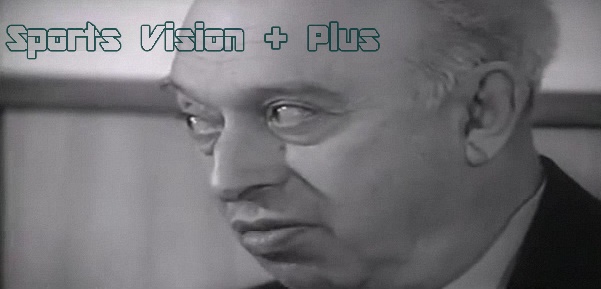
Mr. Skender Vila
Tartari was a physical education teacher, but also a volleyball player of Dinamo`s coach Vangjel Koja.
Several girls from the Pedagogical and Foreign Language School participated in the activities of Tirana high schools. Officially, the one who started the team as a coach was master Harun Dajaka, who tried in the second category, then brought the Dinamo team to the First.
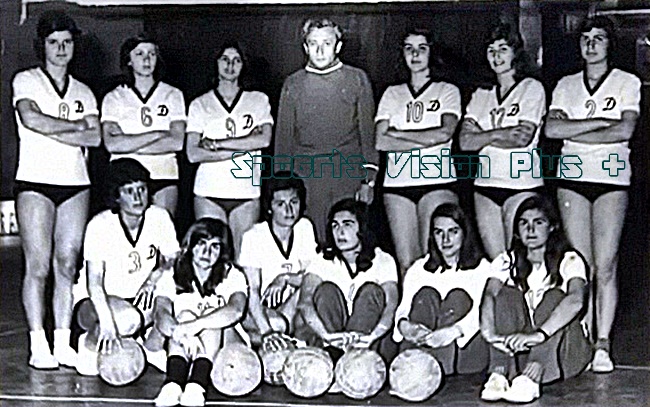
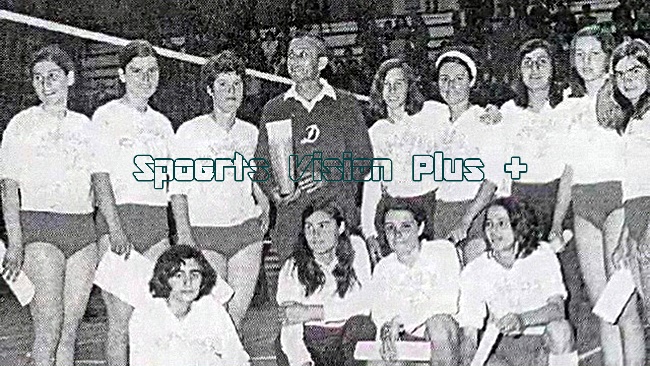
One of the first Dinamo Team on the 70-ties with the coach Harun Dajaka.
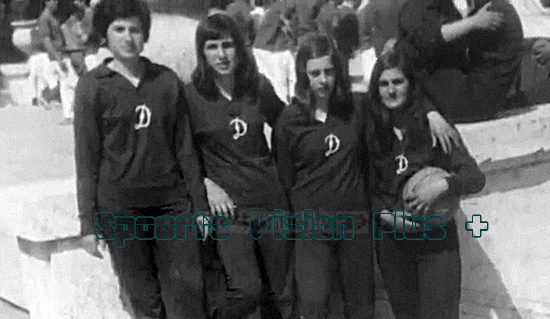
Tartari took over the team in 1972, when Dinamo was positioned in 7th place in the previous championship and within the first year came third in the championship and in the Republic Cup.
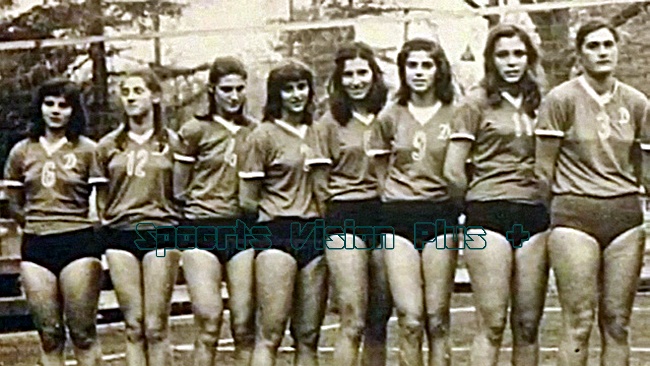
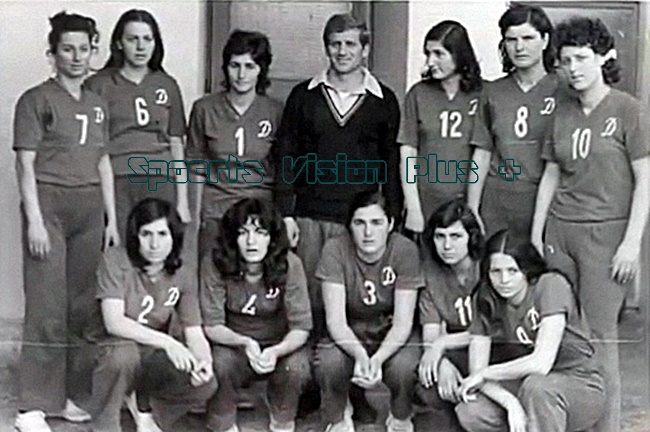
In 1974 Dinamo became champion and at the same time won the Republic Cup. The composition of the team at that time, which had captain Donika Muka, among others, were Ela Tase, 15 years old, who would become the best Albanian volleyball player, one of the best shooters in Europe, Mimoza Ibrahimi (15 years old), Eva Kavaja, Semiha Sulejmani, Fatmira Dreni, Brikena Çabej, Zana Bekteshi, Liza Gjinaj, Fatime Ibrahimi, Valentina Dashi, Irma Hila.
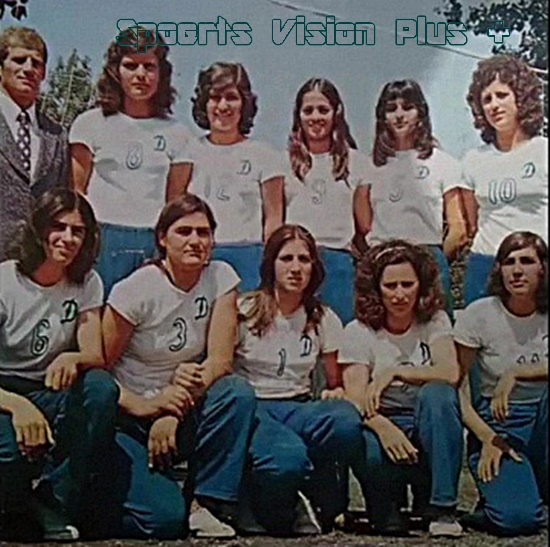
Over the years, the team, of course, added other names such as: Silva Turdiu, Fatmira Podgorica, Zana Karagjozi, Emona Gripshi, Lulëzime Duka, Vera Backa with the profession of textile worker, as well as Mira Muka, the sister of the captain Donika Muka, with the profession of dentist.
Later, Dinamo would also feature prominent players such as Agi Babuli, Jorgjeta Qirici, Darina Nishku and even the generation of Alketa Doçi.
Dinamo achieved mastery of this sport quite naturally, just like the Albanian saying of “appetite that comes eating”. This team of European proportions was formed gradually, in every detail, with care, patience and scrupulousness, like the saying about the Roman Empire that was not built in a day!
Well-organized training sessions, discipline, hard work and dedication were some of the stages that shaped the Dinamo team.
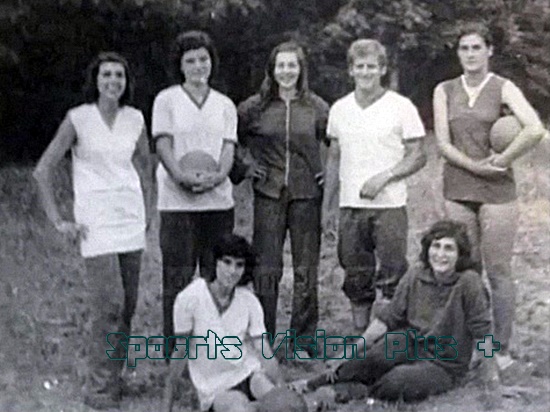
Dinamo had a shooter like Ela Tase who could turn the team into a racing car, it had an excellent organizer like Mimoza Ibrahimi, the heiress and student of captain Donika Muka, who stood out not only in Albania but also in Europe as one of the best passers, without forgetting Duka and Babuli as well as the other players who formed an invincible ensemble, where victory in most cases depended on the team players themselves.
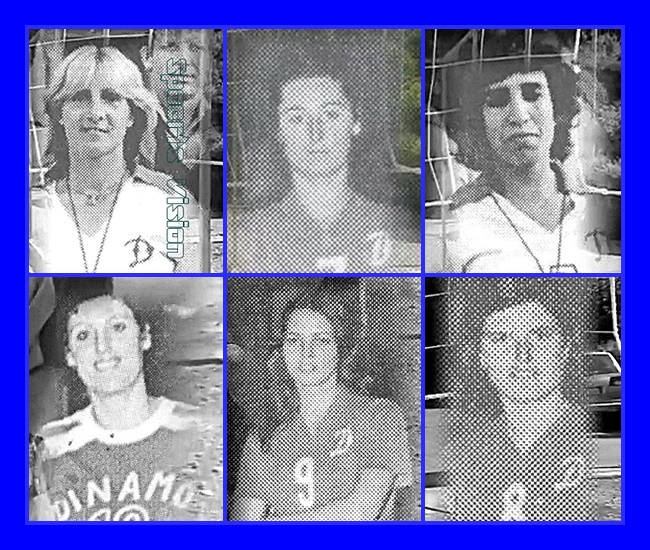
So the team quickly became the protagonist with its own dictate. It completely takes the stage from the volleyball players of the “17 Nentori” team since the 70s and becomes the winner of the National Championship for 10 consecutive seasons without interruption: 1973–74; 1974–75; 1975–76; 1976-77; 1977–78; 1978–79; 1979–80; 1980-81; 1981-82; 1982-83.
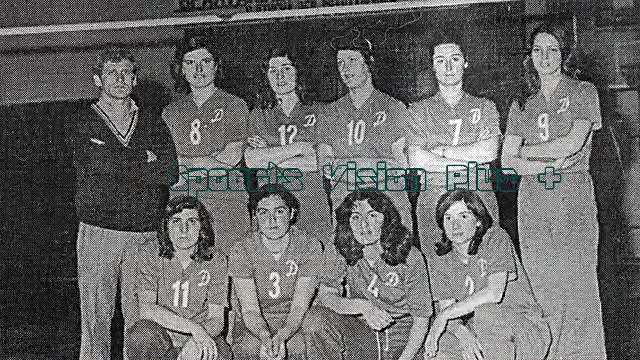
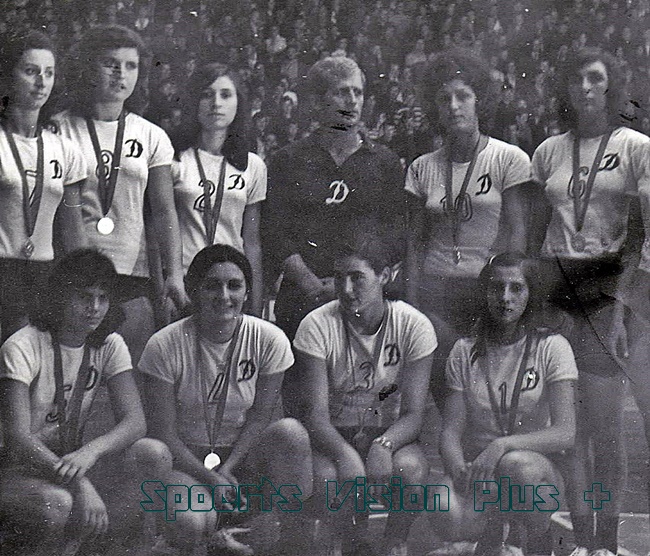
They seem unstoppable but nevertheless “Skenderbeu” and sometimes “17 Nentori” without forgetting “Flamurtari” (as the winner of the Cup in 1979) in some cases will be the teams that will turn into their rivals, making the matches interesting and full of emotions.
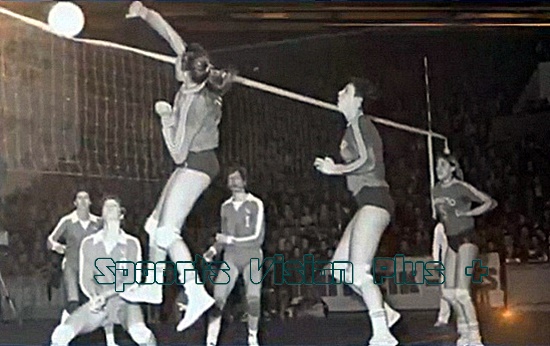
Then Dinamo returns to the titles in the seasons 1986-87; 1987-88; 1988–90; 1990–91……
Meanwhile, it would win the Republic Cup in the years: 1974; 1977; 1980; 1981; 1982; 1985; 1986; 1987; 1988; 1989; 1990; 1991.
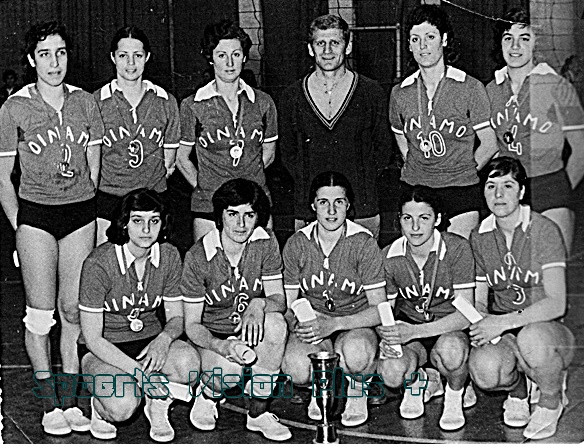
3.
In 1974, Dinamo, after having come three years earlier from the second category (1971), becomes the double winner in Albania, of the champion title and the Republic Cup.
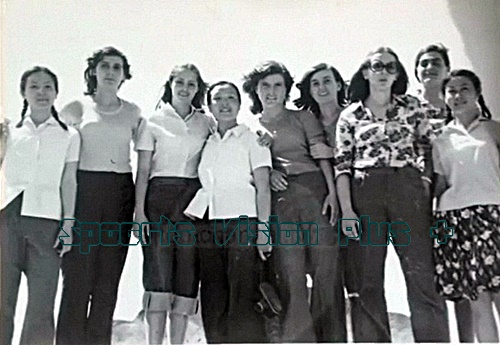
That same year, the team travels to the P. R. of China for a friendly tournament that will last from May 26 to August 7. 11 will be the matches that this team will play, of which five will be victories and six losses.
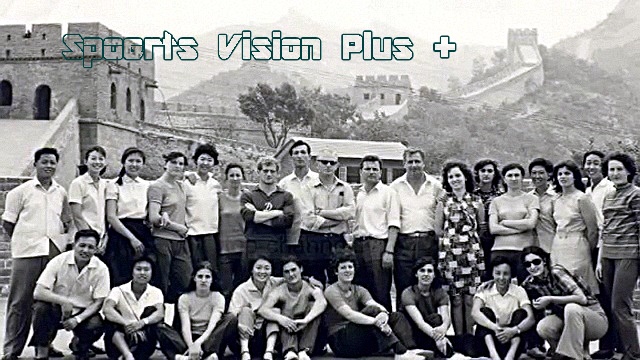
Dinamo in China
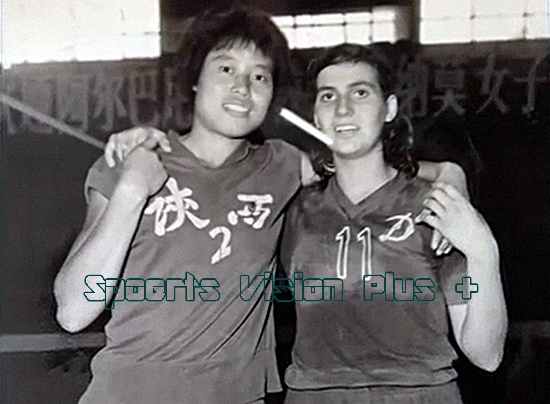
The proof that Dinamo was a strong and European volleyball team, is immediately evident in the international arena, in the European cups.
In the international arena, Dinamo makes its debut in the 1978-1979 season in the Champions Cup (today Champions League).
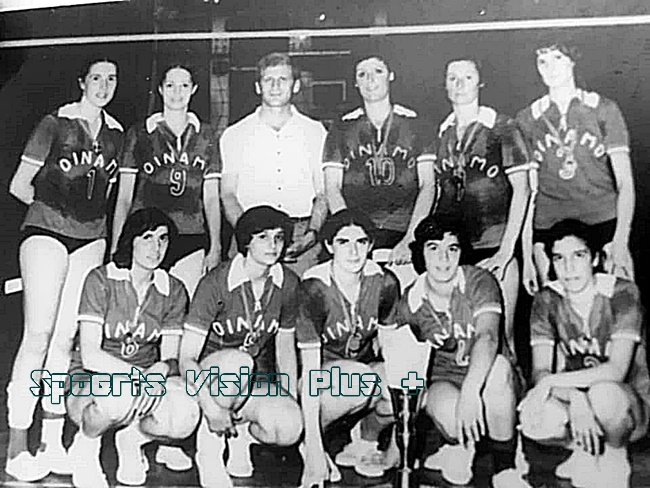
In the first round, they pass through the Austrian team “Post” Vienna, due to the opponent team not appearing in Albania.
In the second round, the draw pits Dinamo against the Czech team “Slavia” Bratislava (winner of the Cup Winners’ Cup in the 1975-1976 season), which will be the first witness in Europe to test the strength of the Albanian girls of Dinamo, who have turned into a proven war machine.
And so, on December 9, 1978, Dinamo wins in Bratislava 1-3, (13-15 8-15 15-13 7-15). Everyone thinks that the qualification has been achieved, but on December 16, in the return match, suddenly, Dynamo, due to lack of experience and complacency and perhaps not correctly assessing the opponent, and thinking that they already have an easy qualification for the final four, lose it with the same result, 1-3 (9-15, 16-14, 9-15, 9-15) and even the elimination becomes more bitter when the point-difference is just for one point: 101-102 !!!
CSKA Sofia will win the champion title by defeating the Hungarian team NIM-SE of Budapest in the final. In third place will be Dynamo of Berlin and in fourth place, precisely “Slavia of Bratislava.
A season later, 1979-1980, Dinamo, the national champion, returns to the European Champions Cup. Among its ranks we can mention: Tatjana Aliko, Eva Duni, Lulezime Duka, Emona Gripshi, Eva Kavaja, Mimoza Ibrahimi, Irini Iftiu, Fatmira Podgorica, Flora Pushaj, Ela Tase, and the distinguished student Silvia Turdiu, the girl who will become a deep trouble for the prime minister of the Albanian Socialists, Mehmet Shehu!
On, December 8, 1979, the Dynamo return from West Germany after having defeated the local team in Meinerzhagen, SV Schwerte 1-3, just like a year ago, with the sets 15-8, 7-15, 13-15, 9-15, in the first round of the starting 16 of the trophy. Dinamo works hard not to be complacent and repeat the mistake of last season, and in the return match on December 15 in Tirana, they defeated SV Schwerte 3-0 with the following sets: 15-6, 15-3, 15-11.
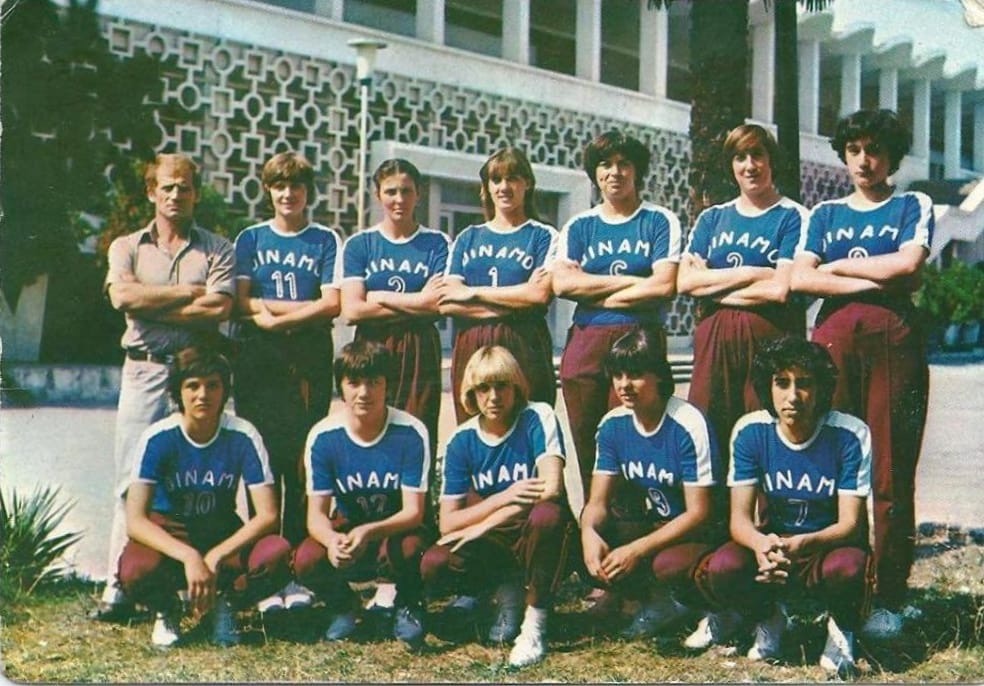
In the quarterfinals, Dinamo will face the Italian team 2000Uno Bari, on February 9, 1980, which they lose 3-1 (17-15, 15-7, 9-15, 15-9).
However, the Italians did not do the calculations properly and in the return match in Tirana on February 16, they are badly crushed 3-0 with sets:
15-9, 15-5, 15-1 for Dinamo of the Albanian brand, which sees itself in the final group “Final Four”, in the four best teams of Europe which will hold meetings between them in Jicin, Czechoslovakia from March 7-9, 1980 in a points system.
Historic Achievement from the Albanian Voley team!!!
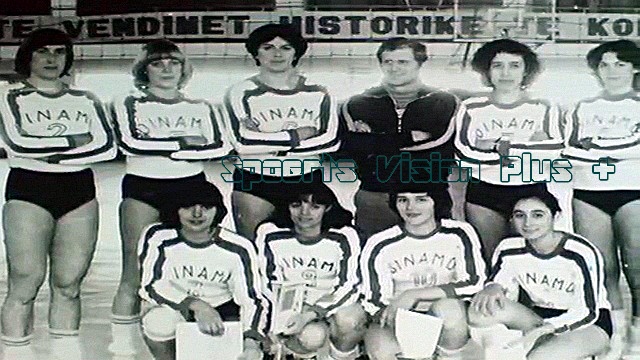
On March 7, Dinamo felt the strength of the Czechoslovak team “Ruda Hvezda” from Bratislava as they lost 3-0 (15-7, 15-3, 15-4), in a poor performance, especially in the 2nd and 3rd sets, despite the opponent having already won this cup in 1975-76 and will be the winner of this season. The Czechs have also won the Cup Winners’ Cup in the 1978-1979 season.
A day later, on March 8, another Dinamo team took to the court with a new motivation that led them to victory against the Hungarian team NIM/SE Budapest, 3-0, (15-11, 15-13, 15-12), the runner-up of the previous season’s European Championship and winner of this cup in the 1972-1973 season.
In the third and final match of these finals, Dinamo had a weak start and lost the entire match 3-0 against the Turks of Eczacibasi (2-15, 13-15, 8-15). Dinamo will take 4th place, only thanks to the difference in points accumulated in the sets 3-6 / 82-126!
Dinamo, one of the four best teams in Europe, had this lineup: Tatjana Aliko, Eva Duni, Lulëzime Duka, Emona Gripshi, Eva Kavaja, Mimoza Ibrahimi, Irini Iftiu, Fatmira Podgorica, Flora Pushaj, Ela Tase, Silva Turdiu; Coaches: Kreshnik Tartari, Ilir Cirinaku!
For Dinamo, the 1980-1981 season will start on December 13, 1980, with a beautiful victory, in the first round of the 16 participating teams, in Tirana against the Swiss team “Uni Basel”, 3-0 (15-7, 15-5, 15-11). Meanwhile, on December 20, the Albanians travel to Basel for the return match, which they also win convincingly 3-0 (5-15, 6-15, 2-15). The year 1980 ends with Dinamo in the 8th best teams in Europe, in the quarterfinals of the Champions Cup.
On January 10, 1981, in Tirana, they will face the strong East German team SC Traktor Schwerin, in a match with strong emotions and heartbeats. Dinamo starts well as they win the first set 15-9.
The East Germans are surprised by the strength of the Albanian team, and organize themselves well by winning the next two sets, 15-11; 15-10. Now they seem to be calmer, leading 2-1. But Dinamo’s reaction is immediate and they win the 4th set 15-6, tying the match 2-2 in sets.
However, the East Germans win the final set 15-6 and the entire match 3-2, thanks to their experience and perseverance, the quality that made the difference between the two teams.
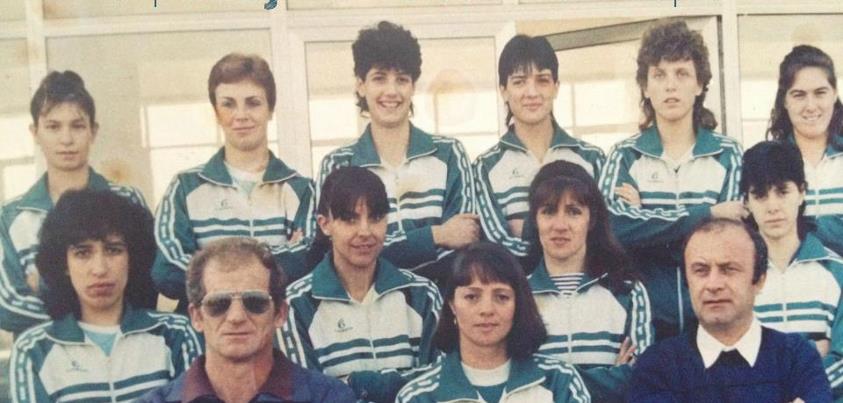
The desire to make their match their own was not enough for Dinamo, which in the second match, on January 18 in Germany, made a weak performance, losing 3-0 (15-5, 15-5,15-3) and being eliminated, without being able to repeat the success of last year when they entered the Final Four.
It should be noted that SC Traktor Schwerin is the team that had won the Champions Cup in the 1977-78 season and the Cup Winners’ Cup in the 1974-75 season.
Meanwhile, the Champions Cup of this season 1980-1981 will be won by the Soviet Union team “Uralochka” Sverdlovsk!
The new 1981-1982 Champions Cup season finds Dinamo in West Germany, where on December 12, 1981 they lose 3-0 against the local team SV Lohhof (15-6, 15-12, 15-11).
In the return match on December 19, Dinamo defeats the Westerners 3-0, who only resist in the second set (15-5, 15-12, 15-3);
Dinamo, thanks to the 74-65 point difference, is qualified)
Okay, what happened next we will try to examine below: CEV (European Volleyball Confederation) did not send a second international referee in the Tirana match, but permitted a second Albanian one (in fact as always in Albanian home matches).
CEV accepted Lohhof’s complaint after 10 days and not only 48 hours (art. 10 of CEV regulations), and it asked the Albanian Volleyball Federation that Dinamo played a third match in a neutral country.
AVF refused to do it, and Dinamo Tirana unfairly eliminated.
Lohhof wasn’t Federal German Champion 1980-81, and it had no right to play in Champion Clubs’ Cup 1981-82, according to art. 1.3 of CEV regulations. USC Münster was German Champion!
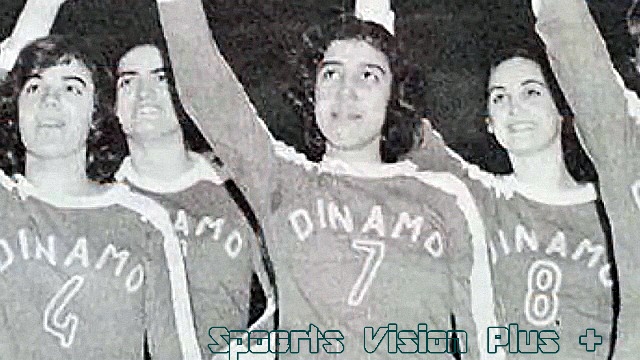
In the following seasons, Dinamo would continue to leave its mark on the history of the Women’s Champions Cup, standing out with quality matches, full of emotion and beautiful victories over teams with a strong presence in the European arena, winners of continental trophies.
For example, in the 1982-1983 season, it is worth mentioning a victory for Dinamo against Eczacibasi of Turkey, which it defeated in two matches for the second round of 16 teams of the Champions Cup.
The first match in particular turned out to be a spectacular victory in all directions. A clean 3-0 on December 4, 1982 in Tirana after the sets: 15-4, 15-3, 15-1, making the Turkish team non-existent throughout the match, especially in the third set where the opponents only managed one point.
Even in Istanbul in the second match on December 12, Dinamo of the Albanian girls also left its mark of victory 3-0 with sets: 12-15,
14-16, 8-15).
While in the 1984-1985 season, Dinamo in the second match of the round of 16, also for the Champions Cup, held in Tirana on December 8, 1984, will win 3-1 against the strong Italian team Olimpia Ravenna after sets: (9-15, 15-7, 15-12, 15-5), revealing a game of high efficiency even though unfortunately it failed to qualify after having lost the first match in Italy 0-3 (10-15, 18-20, 2-15)!
The only thing that stood out in the first match was the second set, which was a long marathon with drama and strong emotions for the spectators who witnessed the strong play of the Dynamo girls.
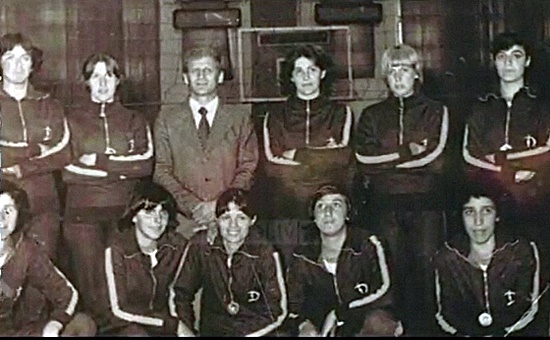
4.
In the 1985-1986 season, Skenderbeu of Korca will represent Albania in the European trophy, while in the following two seasons, 1986-1987 and 1987-1988, Albania will withdraw from participation.
Dinamo, made in Albania, will return to the Champions Cup match courts after three seasons of absence.
However, the return will not be successful. Dinamo of the 1988-1989 season would lose in both matches in the first round of the Champions Cup to the Romanian team Universitatea Craiova, on November 6, 1988 in Tirana, 3-0 (12-15, 13-15, 12-15) and on November 13 in Craiova also 3-0 (15-10, 15-1, 15-5).
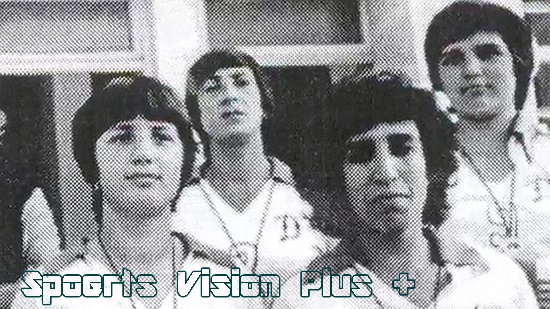
But the peak, the highest peak of the success of the Albanian women’s volleyball team will be reached in the following season, 1989-1990!
In Albania, these are the years when the wind of changes in the government system is felt. The country’s economy is in free fall, yet factories and industries continue to function somehow.
The transition to a democratic system brings consequences and causes in the life of a 50-year-old people closed to the outside world, who have poured into the squares demanding that Albania become like Europe.
And in fact, as it turned out later, the long and endless road of a democratic process brought high prices in every area of life to be paid by the Albanians themselves who lost even the little they had, a job, homes, money in the pyramids, public order and tranquility, the security of a life that although was simple and modest, suddenly they woke up the next day without a secure future and even the bad year of 1997 would completely take the lives of thousands of Albanians, in one way or another due to a chaos and extremely honorable situation created where of course the beneficiaries are the abusers and the corrupt political class, holding hostage in space and time an entire country with its people scattered among the emigration routes in the world.
The “Wind of Changes” has begun to be felt in all the countries of the Eastern Bloc. The fall of the Berlin`s Wall, the democratic developments in Poland, Hungary, Poland brought the collapse of the communist system which will be followed later with the dissolution of the Soviet Union into republic states.
Yet sport never stopped even in small Albania where a team like Dinamo of women’s volleyball, gave Albanians pride, hope and light in those dark years of the beginning of a failed democratic transition from the start!
It is November 5, 1989. In Poland, the Albanian team Dinamo starts the Champions Cup season for the first round against the local team Stal Bielsko-Biala. And here, the Albanians have won 3-1, after sets (14-16, 12-15, 15-9, 8-15).
Pretty good! The good start is half job done!
On November 12 in Tirana, in the second match, the “Partizani” Sports Palace is packed. Dinamo does not disappoint its fans by winning 3-2 (9-15, 15-10, 15-12, 12-15, 15-9) and advancing to the round of 16!
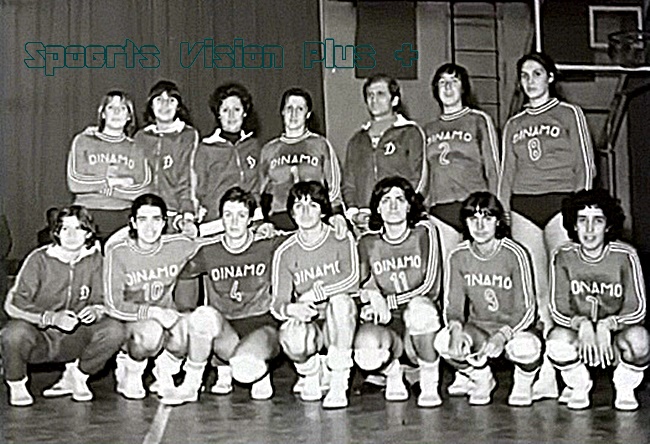
The road to success begins and takes shape! The next opponent is named “Dynamo” Berlin, three-time winner of the Cup Winners’ Cup in 1977-78, 1983-84 and 1984-95.
The two Dynamos met on December 2, 1989 in the first match in Berlin. The East Germans won it 3-1, but how much will it take for them to defeat the European-level game of the Albanian girls, which is also shown by the numbers of the sets 10-15, 15-11, 15-13, 15-7.
In the return match that took place on December 10 in Tirana, the East Germans will surrender unconditionally, accepting the 3-0 defeat of the Albanian Dinamo
(15-8, 15-10, 15-9).
The crowd of fans cannot contain their team’s enthusiasm for qualifying.
The ruthless shooting of Ela Tase, the organization of the game of Moza Ibrahimi who composes, the scorers Agi Babuli and Alketa Doci the core of the team, know how to excite the crowd of Albanian fans!
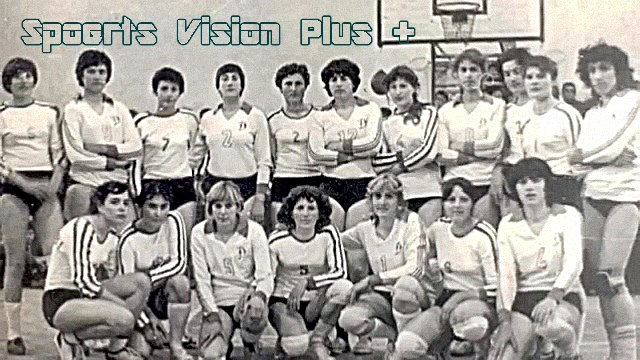
Dinamo advances to the 8 best teams in Europe!
Ironically, its opponent in the quarterfinals will be another Dinamo, that of Bucharest of Romania.
On January 18, 1990, in Tirana, in a very full Sports Palace, Dinamo of the Albanian brand defeated that of Bucharest 3-1 (15-6, 10-15, 15-9, 15-4).
The Albanian Dinamo has surprised the entire European volleyball community, its opponents and its fans. It has now announced its candidacy to enter the final four. They travel to Bucharest for the return match. On January 25, both Dynamos will take to the court of the Bucharest Sports Complex.
The game has started strong, with rivalry and balance, which is also shown by the result of the first two sets (1-1) 15-12 for the Romanians, while the Albanians win the second 15-13.
The Romanians manage to win the other two sets (15-7; 15-9) and the match 3-1 but are unable to qualify for the “Final Four”.
It will be the Albanian Dinamo which, thanks to the difference in points accumulated (92-98), will be the fourth team of the final group that will take place in Forli, Italy from 23-25 February 1990.
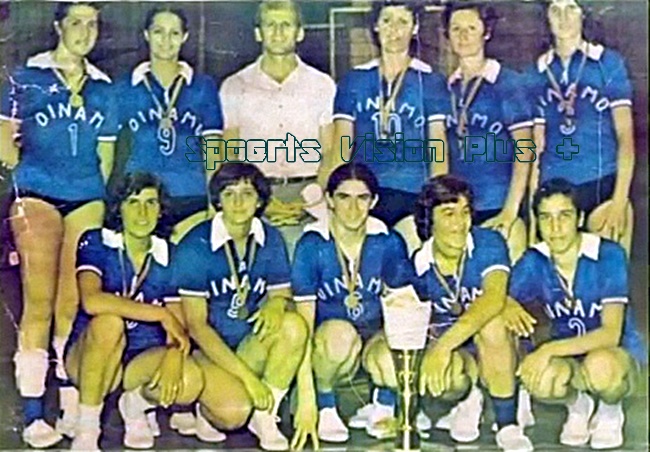
Dinamo Tirana has just achieved another historic success in Albanian Volleyball.
After the 1979-1980 season, it is for the second time in the four best teams in Europe for the Champions Cup!
At this point, Dinamo will face an absurdity of the time, of the strange “rule” of a system that has begun to collapse.
Since Socialist Albania was a country extremely isolated from both the eastern and western blocs, the Albanian People’s Party, PPSH, which enjoyed power since 1946, had predetermined in all fields as well as in sports, not to participate with countries that the party itself considered “enemies” such as the Americans, the Soviets…..
The Minister of Culture and Sports for the time being in Albania has been informed and is expected to make a decision on whether Dinamo will participate in the Final Four or will withdraw due to the fact that they have to play against the Soviets of Uralochka.
The answer is not delayed and even paves the way for Dinamo’s participation in the Final Four, but with one condition: “Not to shake hands with the Soviets and not to show any sign of friendship or closeness.”
Only God understands how such a decision can be interpreted in a sports competition where the protocol includes greetings, hands shaking between the two opposing teams before the start of the challenge.
Otherwise the match never starts.
Like it or not, you have to!
It is part of etiquette, all the more so Sport is the path of unity of every society, it builds bridges of unity for humanity without distinction.
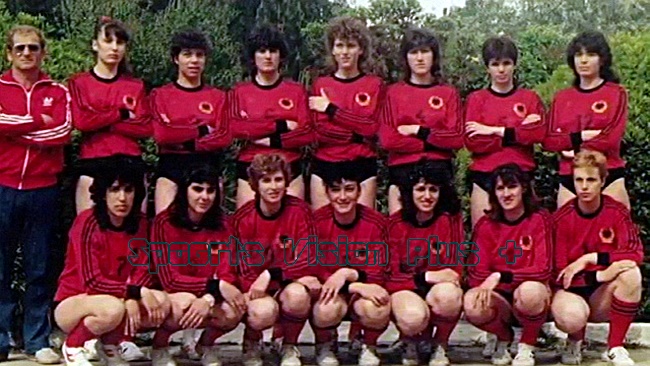
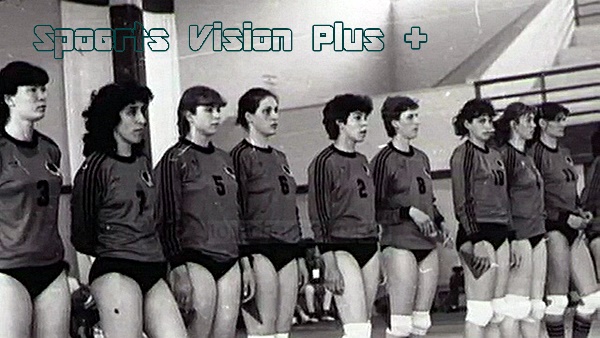
Albanian National Team, where most of the players are from Dinamo
However, Dinamo of course travels to Forli and so on February 23, in the opening match of these finals, the Albanian team will have to face one of the strongest teams in Europe, the Soviets of Uralochka Sverdlovsk, among others winners of this trophy in 1980-81, 1981-82, 1982-83 and 1986-87. Winner of the Cup Winners’ Cup in 1985-86. A team with experienced, compact players and a long experience in European cups.
Albanian Dinamo nevertheless tries to make a dignified appearance by honoring its activity and participation even though the loss is heavy, 3-0 (15-3, 15-7, 15-3).
On February 24, 1990, facing Dinamo is the Italian champion Teodora Ravenna, winner of the Champions Cup for the 1987-88 season. Albanians show signs of insecurity, inferiority and perhaps conditioned by the big name of the opponent they lose the match 3-0 (15-3, 15-2, 15-7).
Just one day later, on February 25 at the Forli Sports Palace, Dinamo managed to win against the French team Racing Paris (Fra) 3-1 (15-11, 3-15, 16-14, 15-5), returning to Albania with the bronze medal from this season’s Champions Cup.
The final classification was as follow:
1st – Uralochka 6 Pts / 2nd – Teodora 5 Pts / 3rd – Dinamo 4 Pts
4th – Racing 3Pts
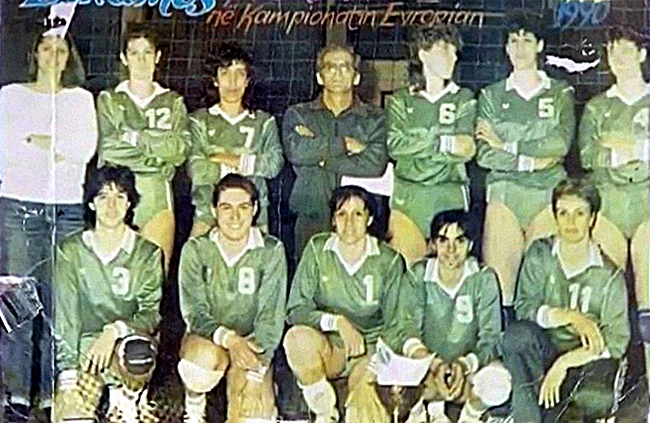
Dinamo, the third best team in Europe, had this composition:
Agi Babuli, Merita Berisha, Alketa Doçi, Mimoza Ibrahimi, Gentiana Kambo, Dorina Nishku, Jorgjeta Qirici, Ela Tase, Ogerta Tola, Majlinda Xhufi;
Coaches: Kreshnik Tartari, Eva Kavaja!
Meanwhile, Alketa Doci and Smirnova of Uralochka were the best scorers with 65 such.
Undoubtedly, this was the most successful season of the Albanian Dinamo girls, national pride in those dark years of chaos that Albania was going through as a result of the changes in the countries of Eastern Europe which affected the small country of Epiro-Illyrian origin quite a bit!
With the end of the 80s, the Dinamo girls closed the golden cycle of Albanian Volleyball. They somehow managed through sport to present a completely different Albanian society with the images that had begun to circulate on the screens of various televisions around the world, precisely at the beginning of the 90s!
It was this Dinamo, it was those rare girls who, through the sport of Volleyball, showed Europe that Albania, although a small country, is capable of achieving great achievements and even producing champions and talents not only in sports, thanks to the dedication to work, commitment, creative and peace-loving spirit of the Albanian people.
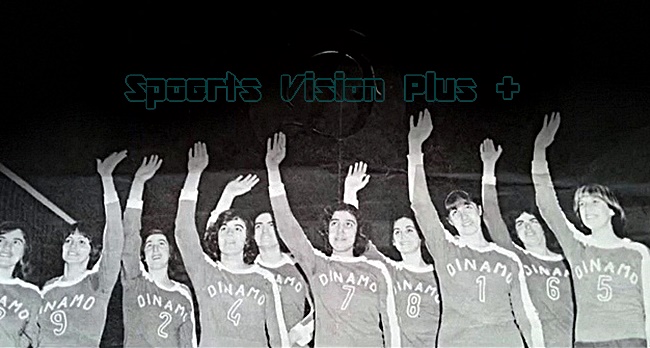
These women gave so much to their country and people through sport. They gave hope, faith, perseverance, pride as a ray of light in the days of chaos, the nightmare of uncertainty of that life on the edge.
Today, most of those heroic ladies, Ela, Moza, Alketa, Lula, Agi and all the rest of them admit that they feel more valued and honored precisely by sports fans, by their people than by the medals and honor rolls they collected through the years.
© Copyright
By Pjerin Bicaj
New York: December 27, 2024
___________________
Sports Vision +Plus in activity since 2013
Discover more from Sports Vision +
Subscribe to get the latest posts sent to your email.

